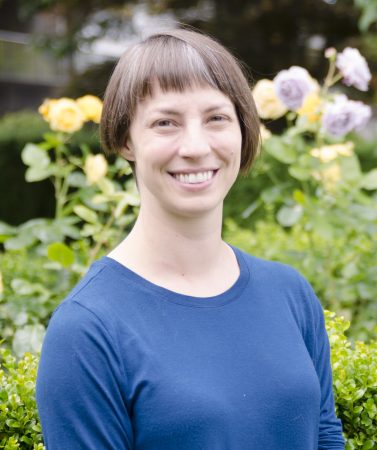Catherine (Cat) Prueitt
Research Area
Education
Ph.D. Emory University
About
Office Hours – 2025W
- In-person: Tuesdays 10:00am-10:45am
- In-person: Thursdays 2:00pm-2:45pm
- Location: BUCH E378
- Also available by appointment
Teaching
Research
My research engages Classical Sanskrit philosophies with a focus on how these traditions contribute to our contemporary understanding of human experience. I work within the Classical Sanskrit pramāṇa framework, which focuses on what and how we can know about reality given our embodied position within an intersubjective world. I find that the 7th century Buddhist Dharmakīrti’s apoha (exclusion) theory of concept formation, especially as modified by the 10th-11th century Hindu Pratyabhijñā Śaiva tradition, offers compelling insights into fundamental questions surrounding the intersubjective world construction, the nature of agency, and the ethical implications of how we form our worlds.
Publications
- 2024. “Why Care about Freedom and Agency?” The Journal of Hindu Studies. 2024. “Vol 17, No. 1: 117-142. https://doi.org/10.1093/jhs/hiad027
- I draw out some surprising ethical consequences from the metaphysics of agency found in Pratyabhijñā Śaivism, a 10th-11th century Sanskrit philosophical tradition.
- 2023. “Apoha.” Routledge Encyclopedia of Philosophy, https://www-rep-routledge-com.proxy3.library.mcgill.ca/articles/thematic/apoha/v-1. DOI:10.4324/9780415249126-ZB002R1-1.
- My entry tackles early Buddhist formulations of the highly technical apoha theory of concept formation.
- 2022. “There’s More to Transparency than Windows.” With Katia Samoilova. Oxford Studies in Epistemology, Volume 7: 245-260. DOI: 10.1093/oso/9780192868978.003.0008.
- Equal co-authorship. My co-author and I worked together from our respective areas of expertise to develop a novel critique of contemporary views on the transparency of experience, as well as a Sanskrit-epistemology-inspired alternative theory.
- 2021. “In Defense of Some Absurdities.” Oxford Public Philosophy Journal, Turn Two. https://www.oxfordpublicphilosophy.com/south-asian/tzohar-feature#prueitt
- My piece provides an analysis of alternative philosophical positions entailed by the theories that Tzohar documents in his book A Yogācāra Buddhist Theory of Metaphor.
- 2020. “Beyond Time, Not Before Time: The Pratyabhijñā Śaiva Critique of Dharmakīrti on the Reality of Beginningless Conceptual Differentiation.” Philosophy East and West. Vol. 70, No. 3: 594-614.
- I conduct philosophical analysis of a key question on the coherence of Dharmakīrti’s theory of apoha.
- 2019a. Critical review essay of Human Being, Bodily Being: Phenomenology from Classical India, by Chakravarthi Ram-Prasad. MIND. DOI: 10.1093/mind/fzz052
- My review focuses on the standards and methods of ethical communication in the negotiation of bodiliness, especially in sexualized encounters.
- 2019b. “Is There an Ideal Scientific Image? Sellars and Dharmakīrti on Levels of Reality.” In Garfield, Jay, ed. Wilfrid Sellars and Buddhist Philosophy: Freedom from Foundations. Routledge Studies in American Philosophy. New York: Routledge, 48-66.
- My chapter presents a new solution to a thorny problem in understanding Dharmakīrti’s ontology, and uses this clarification to advance contemporary debates about the limits of scientific explanation.
- 2018a. “Karmic Imprints, Exclusion, and the Creation of the Worlds of Conventional Awareness in Dharmakīrti’s Thought.” Sophia. Vol. 57: 313-335.
- This article provides a technical analysis of and solution to the problem of whether or not Dharmakīrti’s apoha theory is hopelessly circular. Against the major strands of contemporary scholarship on this matter, I argue that it is not.
- 2018b. Review of Refiguring the Body: Embodiment in South Asian Religions, by Barbara Holdrege and Karen Pechilis, eds. Body and Religion. Vol. 1.2: 212-217.
- My review poses a methodological critique and questions the ethical consequences of the claim that an individual’s health is rightly accounted for by that individual’s own actions.
- 2017. “Shifting Concepts: The Realignment of Dharmakīrti on Concepts and the Error of Subject/Object Duality in Pratyabhijñā Śaiva Thought.” The Journal of Indian Philosophy. Vol. 45: 21-47.
- This article maps a crucial divergence between Dharmaīrti’s understanding of how intentional structure arises for sentient beings, and that of Pratyabhijñā Śaivism.
Recent and Upcoming Presentations
- “The Direction of the Artist, the Direction of the Connoisseur: Agential Fluidity and Aesthetics.” American Philosophical Pacific Division Annual Meeting (April 2025, San Francisco, USA)
- Translation Roundtable on Prajñākaragupta’s Commentary on PV 3.1-3.4. American Academy of Religion Annual Meeting (November 2024; San Diego, USA)
- “From Self-Deception to Open Empathy: Abhinavagupta on the Arts of Agency.” Workshop on Extraordinary Forms of Perception in Sanskrit Philosophy (October 2024, Yale University, New Haven, USA)
- “Prajñākaragupta on the Two Truths: An Ontologically Pluralist Account?” Madhyamaka in South Asia and Beyond International Workshop (August 2024; University of Vienna, Austria)
- “Understanding the Agent of Collective Suffering.” The 12th Annual East/West Philosopher’s Conference (May 2024, University of Hawai‘i, Mānoa, USA)
- “Apoha as a Solution to the Decomposition Problem.” The Elephant in the Room: Consciousness Beyond Reductionism conference sponsored by the University of Padua, Mind&Life Europe, and the India Foundation (February 2024, Padua, Italy); International
- “Knowing Emotions vs. Knowing through Emotions.” American Academy of Religion Annual Meeting (November 2023, San Antonio, USA)
- Respondent for “Liberative Uses of the Imagination.” American Academy of Religion Annual Meeting (November 2023, San Antonio, USA)
- “Utpaladeva on Externality.” American Philosophical Association Pacific Annual Meeting Invited Symposium (April 2023, San Francisco, USA)
- “The Art of Agency in a Self-Effacing Universe.” American Society for Aesthetics Annual Meeting (November 2022, Portland, OR, USA)
- “Apoha as a Solution to the Decomposition Problem.” The Sixth International Dharmakīrti Conference (August 2022, Dongguk University, Seoul, South Korea)
- “What Can Be Known in Svasaṃvedana?” The 19th Congress of the International Association of Buddhist Studies (August 2022, Seoul National University, Seoul, South Korea)
- “How to Satisfy the Body’s Command.” Georgetown University Philosophy Department colloquium speaker (February 2022, online due to COVID-19)
- “How to Satisfy the Body’s Command.” Monash University Philosophy Department colloquium speaker (October 2021, online due to COVID-19)
